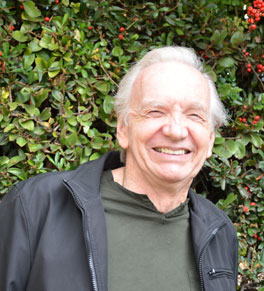Watchman blocks blood clots to prevent stroke

Brian Kleiner couldn’t let an irregular heartbeat interfere with his passion for teaching the next generation of college business students.
After living uneasily with a dangerous condition called atrial fibrillation for four years, the 72-year-old Fullerton resident recently had a Watchman device implanted in his heart by a UCI Health cardiology team at UCI Medical Center.
He was back in the classroom at Cal State Fullerton giving his students an exam the next day.
Dangers of irregular heartbeats
More than 6 million Americans suffer from atrial fibrillation, also known as AFib or AF. The average person with this heart arrhythmia is five times more likely to have a stroke than someone with a regular heartbeat.
They also are at higher risk of heart failure and other heart-related ailments, as well as dizziness or fainting. People with AFib often have to take blood thinners to reduce the chances of clot formation.
The reason: In people with AFib, blood does not move properly through the heart chambers, causing blood to pool in a small pouch atop the heart called the left atrial appendage (LAA), where blood clots often form.
When a clot escapes the pouch and travels in the blood stream to another part of the body, it can cut off the blood supply to the brain, causing a stroke.
Keeping watch on blood clots
Watchman, also called a left atrial occlusion device, is designed to protect against blood clots, heart failure and other heart-related ailments. It is one of several new alternative treatment options the UCI Health Cardiology Services team offers patients with structural heart problems such as AFib.
About the size of a quarter, the device fits over the LAA pouch entrance, preventing blood clots from escaping or new blood from pooling. It’s inserted through the groin and up into the pouch, where it is placed to cover the opening.
After this minimally invasive procedure, it takes about 45 days for the body to grow tissue over the Watchman implant, sealing the pouch closed.
“Once it’s been naturalized by the body, we can safely reduce the use of blood thinners,” explains Dr. David Donaldson, a UCI Health cardiologist and specialist in heart arrhythmia who performed Kleiner’s procedure.
“Eventually, only a baby dose of aspirin daily is needed. The goal is to eventually stop blood thinning medication altogether.”
One-time procedure vs. lifelong medication
The most common treatment for AFib is medication to thin the blood and reduce coagulation. However, there are a number of reasons many AFib patients seek alternatives.
One of the most serious risks is internal bleeding, especially in the brain. This can be either spontaneous bleeding or from trauma due to accidents or falls. The risk of bleeding can affect quality of life. For example, patients may no longer be able to participate in certain activities that may result in a fall. Convenience is another factor.
“Even just a few days of missing pills can result in blood clots,” says Donaldson. “The Watchman is a one-time procedure that is an alternative for taking blood thinners for the rest of one’s life. This is life-changing. It’s a dramatic shift in paradigm and a wonderful option.”
Teamwork at heart
Preparing for the Watchman procedure takes a team approach. Dr. Pranav Patel, UCI Health’s chief of cardiology, referred Kleiner to Donaldson, who directs the UCI Health Heart Arrhythmia Program.
General cardiologist Dr. Byron Allen also referred Kleiner to neurologist and stroke specialist Dr. Jay Shah, who cleared Kleiner for the procedure.
“I think about how many people dealt with me,” says Kleiner. “Everyone operated as a team.”
Donaldson concurs. “We are blessed to have wonderful nurses and staff.”
Kleiner is grateful to everyone who participated in his treatment. He especially relied on nurse practitioner Ly-An Dao: “If I had any questions about things, she would give answers immediately. I could call her directly, and she would always get back to me quickly.”
‘One of the best days of my life’
After the procedure, Kleiner felt no pain and was up and walking the same day. He went home the following day and has only had to return for follow ups to make sure the implant is in place and that his body is adapting to it well.
Kleiner’s only restriction was no heavy lifting for at least six weeks. But he is looking forward to returning to his gym routine and working out with his trainer three times a week.
“My day of surgery was one of the happiest days of my life,” says Kleiner. “My only regret is that I waited too long to start coming to UCI Health,” says Kleiner.
For patients who may be considering the Watchman implant to address their AFib, Kleiner says, “You’re in good hands with Dr. Donaldson and UCI Health.”
Explore Further
Browse more blog posts by topic.




